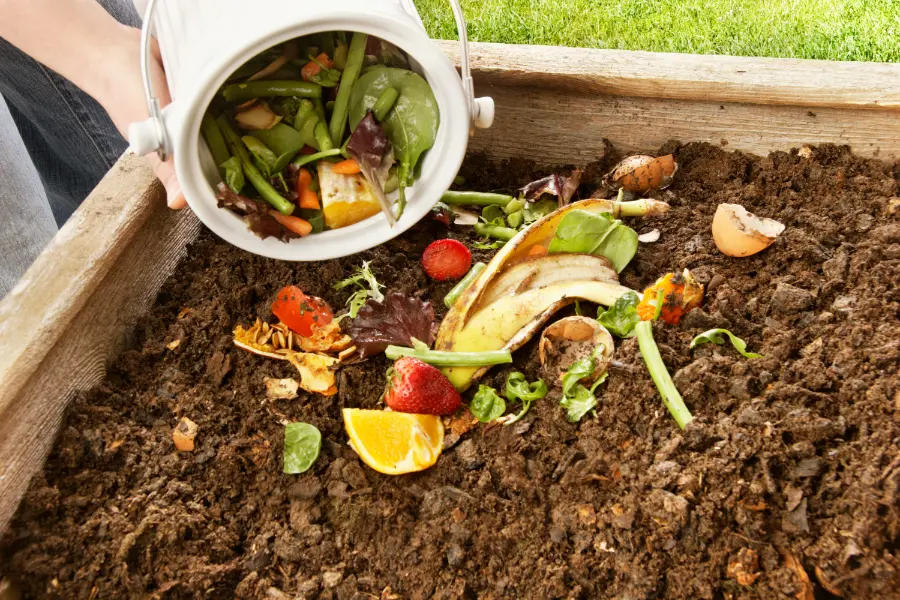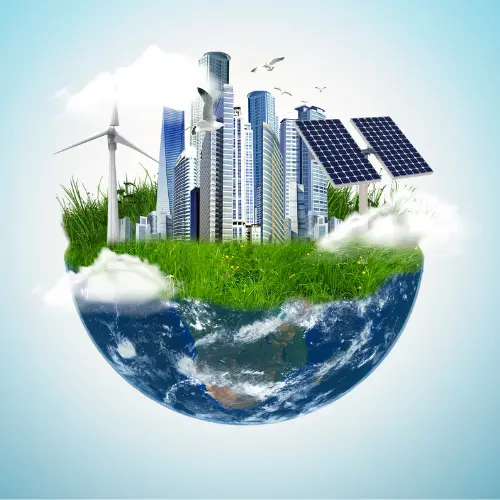The Pros and Cons of Composting
There are many benefits to composting, and those who invest in a composting area in their home can gain positive advantages from the practice. However, there are some drawbacks to setting up compost too.
The pros of composting include its ability to improve agricultural practices and reduce food waste using accessible methods that are beginner-friendly. The cons of composting include the amount of time it takes to generate properly matured compost and the amount of work that goes into composting.
There are more advantages to composting than downsides, but you owe it to yourself to explore both the pros and the cons of compost before you commit to investing in a compost pile on your property. Keep reading to learn more about the reasons why you should give composting a try.
Composting Reduces the Need for Synthetic Fertilizers
One of the biggest advantages of composting is that the end result is compost. This rich organic matter is chock full of nutrients that plants love, making compost perfect for adding to the soil in your borders and vegetable garden.
Amending the soil with compost can result in larger blossoms in your flower beds and a greater output of fruits and vegetables in vegetable beds and orchards.
Synthetic fertilizers can damage the environment, and they’re very expensive compared to creating compost with food waste naturally generated by your household. Synthetic fertilizers may also harm beneficial insects and other wildlife if ingested by them.
Here are some other reasons why compost makes such a great organic fertilizer:
- It’s non-toxic: Compost is naturally decaying organic matter and can’t hurt anything like introducing chemicals to the environment can.
- It’s environmentally friendly: Using food waste to create fertilizer helps keep it out of the landfill, reducing the need for waste disposal and storage.
- It provides trace minerals: Along with major plant nutrients such as potassium and nitrogen, compost also provides trace minerals and vitamins that plants need for optimal health, such as boron. (Source: Bonnie Plants)
Composting Improves the Soil
Another advantage of composting is that it improves soil quality. Compost is a friable material that helps break soil up when it’s incorporated as a soil amendment, increasing the ability of soil to retain water and allow water to freely pass through it.
Composting also adds many nutrients to the soil that make it better food for plants and microorganisms. Rich composted soil is also favored by earthworms, which can further improve soil quality by their presence. Earthworms improve soil’s texture by breaking it up with their movement. They also leave beneficial nutrients of their own in the form of worm castings. (Source: Gardening KnowHow)
Composting Increases Beneficial Bacteria
Composting produces a variety of beneficial bacteria that help to improve the structure of the soil and break down organic materials. Working in high-temperature conditions from seventy to ninety degrees, these bacteria break organic waste in the soil down into simple elements that can be used by the plants grown there.
Not only does composting encourage the production of the beneficial bacteria, these bacteria are the active agents in composting that cause your food waste to be broken down into soil by the compost over time. Without these live bacteria, the food in your composting bin or pile will never break down into a usable form for gardening and other agriculture.
Composting Can Be Done Indoors
Even if you don’t have the room for a large compost heap in your backyard or garden, that doesn’t mean you can’t take advantage of fresh compost from your kitchen’s food waste. There are now many commercial indoor composting bins designed to minimize unpleasant composting odors or the appearance of rooting food.
One way that indoor composting bins help keep down smells is to incorporate technology such as activated carbon filters. These filters help absorb odors and keep the compost bin smelling clean until it can be emptied out.
Keeping a composting pile outdoors doesn’t mean you have to deposit food waste there each time you have some in the kitchen. A solution is to use a container to store vegetable peelings and other compostable food scraps until the container is full, and then it can be added to the composting pile outside.
Indoor composting makes it easy to continue generating fertilizer even when the temperatures outdoors have dropped below the temperatures necessary to produce beneficial bacteria for breaking down compost. It’s also more convenient than having to take your food waste out to the compost heap in the dead of winter.
Composting Is Easy to Do at Home
Unlike some environmentally friendly practices which are difficult to do, composting is simple enough that even children can be taught the concepts of how it works. It can be practiced even in small home spaces and you don’t need a garden to take advantage of the compost that is generated.
If you don’t have a vegetable garden or flower beds, you can dress compost around the base of the trees near your home to give them a much-needed boost of nutrients. This compost will also help to improve the surrounding soil.
However, for people who are interested in gardening or growing their own food, composting is one of the easiest homesteading skills to take on that can have a cumulative positive impact on the preparedness of your household. With each year, a compost heap can generate more and more high-quality soil for your gardens, increasing the yield of your home plot over time.
Compost Increases Filtration of Water Sources
Compost isn’t just good for the soil. The aeration of the soil created by compost and other friable materials within it helps act as a natural filter for any water that passes through the soil. (Source: Scientific American)
Naturally filtered water is free of the pollutants and dangerous bacteria present in stagnant water sources. Once passed over friable soil such as soil with a high mix of matured compost, only clean water is filtered through.
Composting Contributes to Other Agriculture
Composting is an environmentally friendly way to improve the soil, but it also has benefits for other areas of household agriculture. Here are some of the ways compost can be reused elsewhere in the home:
- Fertilizing the garden: Compost is great for side-dressing vegetable beds and orchards to improve the uptake of nutrients in food plants. Since compost is completely organic, there’s no need to worry about using it on any crops you plan to eat.
- Worm bin: Compost is a great amendment to add to a worm bin. Worm bins are containers used to keep and breed earthworms that can then be added back into the soil of the garden and landscaping beds to improve soil structure. Compost contains plenty of rich organic material that earthworms love to feast on, making it perfect worm food.
- Lawn maintenance: Laying down a layer of compost before putting down new sod can help grass establish quickly and can keep it looking lush and green all season long. (Source: Rocky Mountain Compost)
- Seed starting: Sterilized compost is one of the best mediums you can use for starting new seeds, and it’s a lot less expensive than buying seed germinating mix at the home improvement store. To sterilize compost for starting seeds, simply bake the compost in the oven at three hundred and fifty degrees for ten to twenty minutes. (Source: Garden Guides)
- Recycling: If you’re going through the trouble of composting your food waste, chances are you’re more likely to engage in other environmentally friendly practices such as recycling metal and glass. It also gives you a place for discarded lawn clippings and other items you can keep out of the trash.
- Raising small livestock: Making compost can help offset some of the costs of raising small backyard livestock like chickens or rabbits since it can allow you to produce some of your animals’ feed yourself. Compost makes for rich soil that can put out large amounts of feed in a small amount of space for optimal growing conditions.
No matter how you end up using your compost, there’s no question that it can serve many different uses in agriculture and landscaping around your home. For those who don’t garden, it’s still environmentally friendly to create compost for those who do.
Composting Reduces Carbon Emissions
Food waste contributes to a large percentage of the waste that goes into landfills. A lot of energy goes into both disposing of this waste and recycling it into other forms. One of the results of this effort is the generation of carbon emissions, or greenhouse gases. Greenhouse gases are now known to be one of the greatest contributors to climate change.
While it’s difficult for individuals to make a large impact on climate change, we can all do our part by taking personal steps to reduce our impact on global carbon emissions. One way to do that is to reduce our disposed food waste. Composting is the best way to avoid throwing food waste in the garbage other than feeding it to animals in your household.
Composting allows food faste to be recycled rather than discarded. This helps reduce the pressure on landfills and reduces the need to incinerate trash, another practice that greatly contributes to carbon emissions.
Composting Lowers Agriculture Production Costs
For small homesteads and farmers, homemade composting is like printing money. Composting provides a high yield for fruits, vegetables, and flowers for only a small amount of invested time, energy, and money.
Composting is especially useful for farmers who have livestock. Farmers can incorporate the manure of animals such as chickens, ducks, goats, and rabbits into the compost heap to increase the richness of the compost generated. This compost in turn can be used to grow food for animals directly on the property.
Sustainable farming practices such as those that involve composting help keep the costs of small farming down and allow small farmers to carve out a niche for themselves in an increasingly competitive industry.
The Disadvantages of Composting
Even though there are some great advantages to composting, the practice does have some drawbacks too. Here are a few of the disadvantages of composting you may run across while getting your compost pile or bin started:
- Associated costs: Even though composting can be relatively affordable, it does increase a household’s cost to get set up for composting. You’ll need some basic tools to get started, such as a composting bin and a rake to turn the compost. Some composting bins can be quite expensive, while others can be constructed more cheaply at home.
- Composting takes time: Compared to going to a gardening outlet and buying a bag of chemical fertilizer, creating your own quality compost takes at least three months to mature, depending on the size of your compost, the ambient temperatures, and the contents of the compost itself. (Source: Gardeners Supply Company)
- Composting can cause smells and take up space: Composting shouldn’t smell that bad if your ratio of dry composting materials to wet composting materials is correct and you haven’t added things like meat. However, it can still have an odor of decaying material, especially in summer heat. You’ll also need space for a composting area.
- Diseased plants may spread infection: If you pull blighted or diseased plants out of your vegetable garden, you can’t put them in the compost without the risk of spreading soil-borne pathogens to any plants that are dressed with the compost. You’ll also have to be careful not to place pulled weeds in the compost pile to avoid multiplying them.
- Composting takes work: Even though there isn’t a whole lot of work associated with composting, it does still take time and effort to get started and to separate out compost-friendly materials in your food waste.
The disadvantages of composting are mostly matters of minor inconvenience. The benefits you can get from starting a composting practice are well worth the trouble you put in. All it takes is investing in a composting bin and a few extra minutes of sorting in the kitchen.
Composting Is Great for Gardeners
If you’re interested in having a beautiful landscape around your home and gardens or in generating some excellent potting soil for your container plants, you owe it to yourself to start a compost bin or pile. While there are some minor cons associated with composting, these are far outweighed by the pros you can gain by trying it.


